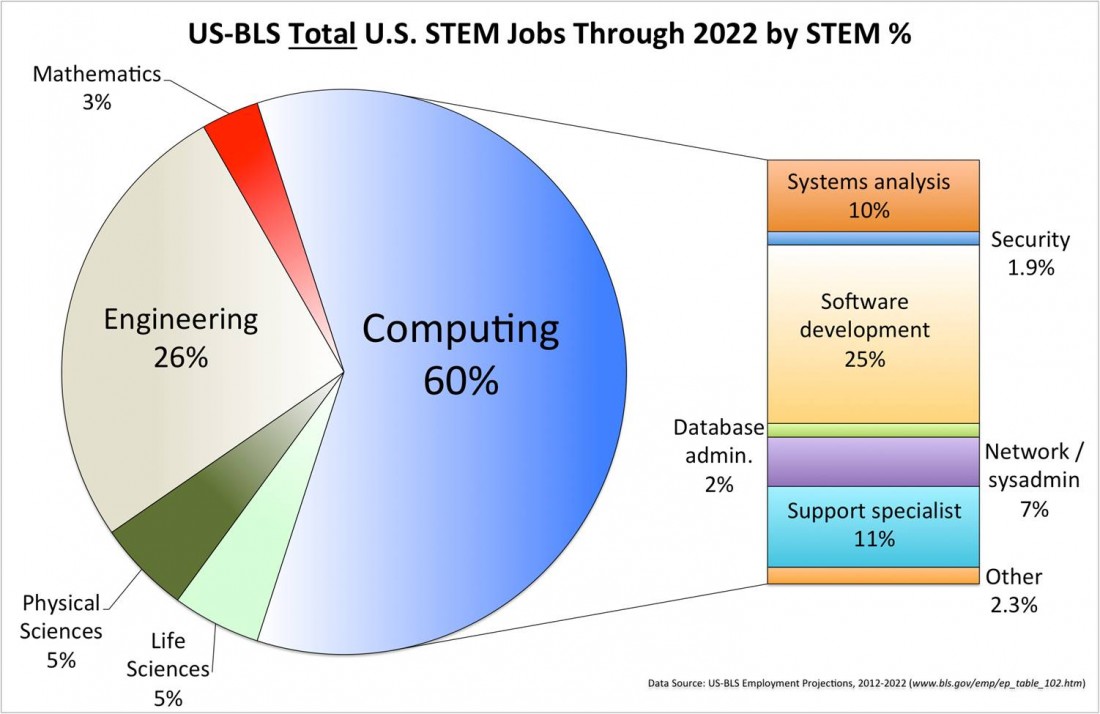Why STEM is Important
STEM Education is the Key to Michigan's Economic Future
Our public education programs lack the funding necessary for much-needed STEM programs. With careers in STEM fields showing substantial growth that is expected to not only continue but increase, a critical need exists for STEM education in Michigan to provide access to training activities that can build skills and apply methodologies for problem solving, innovation, and invention-on-demand in a wide variety of fast-growing fields.
STEM job creation over the next 10 years will outpace non-STEM jobs significantly, growing 17%, as compared to 9.8% for non-STEM positions.1 The occupations with the fastest growth in the coming years - such as biomedical engineers, network systems and data communications analysts, medical scientists, computer programmers, and app developers - all call for training in STEM fields - some degreed, some not.2
College graduates overall make 84% more over a lifetime than those with only high school diplomas. But further analysis of 171 majors shows that STEM majors can earn higher wages.3 According to the Commerce Department, people in STEM fields can expect to earn 26% more money on average and be less likely to experience job loss. The STEM degree holders also tend to enjoy higher earnings overall, regardless of whether they work in STEM or non-STEM occupations.4
And yet the U.S. - and Michigan - are failing to produce enough skilled STEM workers to meet the needs of employers now - and certainly not enough to fill the needs of employers as demand continues to increase in the future. Sixty percent of the new jobs that will open in the 21st century will require skills possessed by only 20% of the current workforce.5 Consider the following:
- The U.S. may be short as many as three million high-skills workers by 2018.6
- And in careers related to connected technologies - which includes just about every industry - industry analysts are projecting a national shortage of 500,000 trained workers by 2020, and an expectation that approximately 20% of that shortage - or 100,000 jobs - will be in Michigan.7
- The U.S. Department of Labor projects that by 2020 there will be 1.4M computer specialist job openings, though at the same time, universities are projected to produce qualified candidates for only 30% of those jobs.
- By 2020, there will be 1M more IT jobs than computer science students in the U.S.
- By 2022, 1.3M IT and Cybersecurity jobs will need to be filled
- 2/3 of IT jobs employers need talent for come from non-tech industries such as healthcare, manufacturing or banking
- 75% of open IT jobs are at the middle or entry-level
- The Top 10 cities with the greatest demand for IT jobs are New York, Washington, Philadelphia, Atlanta, Chicago, Detroit, Dallas, Houston, Seattle and Baltimore; however, for every 8 IT jobs in these cities, the current talent pool only yields 5 workers6
Andrew Rasiej, Chairman of the NY Tech Meeting, said “The only way for this dynamic to change is for the innovation industries to get involved directly in supporting our schools, advocating for new public policies and funding to change the status quo. Failure to engage in this way risks not only the success of our future businesses, but also the future of our communities and our country.”
Your Donation Helps to Fund Important Grant Programs and Daily Operations for The Michigan STEM Partnership.
Individuals and organizations interested in supporting the Michigan STEM Partnership through a donation may do so by clicking the 'Donate' button to make a donation with a credit card via PayPal. All donations, in any amount, are greatly appreciated and tax deductible.
The Michigan STEM Partnership is a 501C3 tax exempt organization and gratefully accepts donations to help further our efforts.
Sources:
1) U.S. Commerce Department, 2011
2) Bureau of Labor Statistics, Ocupational Outlook Handbook, 2010-11 Edition
3) "What's it Worth? The Economic Value of College Majors" Georgetown University, 2010
4) U.S. Commerce Department, 2011
5) National Commission on Mathematics and Science for the Twenty-first Century, 2000
6) Employer Playbook, Best Practices and Tools to Recruit Technology Talent from Non-traditional Sources
7) Gartner





